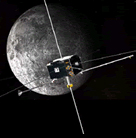Instruments
Frequently Asked Questions
Q: What is the absolute accuracy of the FGM data?
A: All FGM data available for download are calibrated. Currently, the absolute error is less than 0.5 nT for all data with a magnitude under 400 nT. The typical error bar for the DC field is 0.2 nT.
Q: How much does the calibration update affect the data?
A: Less than the maximum absolute error (0.5 nT). The calibration files are updated from time to time in order to improve the data quality.
Q: Is it possible to get data with higher accuracy?
A: Detailed calibration can be done for selected intervals. Contact Karl-Heinz Fornacon k-h.fornacon@tu-bs.de
(He likes gummi bears and Cabernet Sauvignon).
Q: Where can I read more about the FGM experiment?
A: Details about hardware, calibration parameters, and data products can be found in the experiment description (Auster et al., 2008).
Q: Why only use magnitude during eclipses?
A: Without Sun there is no spin pulse; consequently, there is no exact orientation.
Caveats
During eclipses only the magnetic field magnitude is available.
Influence of the solar panels' currents and/or mis-calibration can induce spin tone (0.33 Hz) and its harmonics in the data. Disturbance is less than 0.2 nT.
Spacecraft interferences (sectoring of spin period) can induce disturbances of 11 Hz and harmonics. Disturbance is less than 0.2 nT.
Reduced accuracy for fields over 400 nT due to nonlinearity of DA converters. Disturbance is less than 4 nT.






